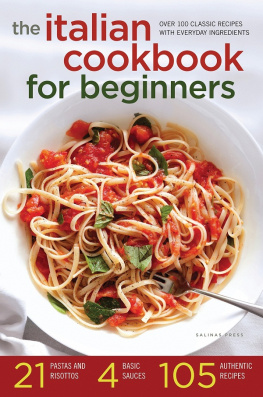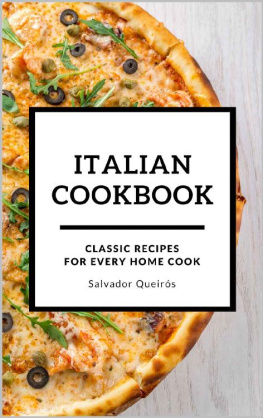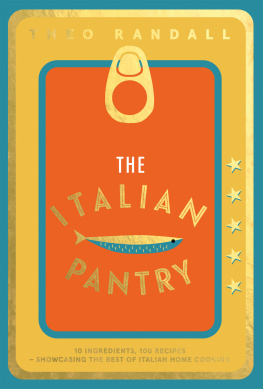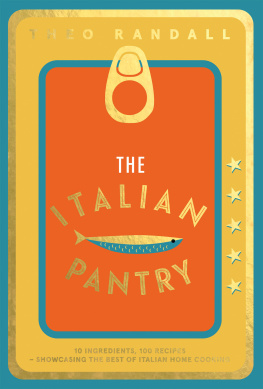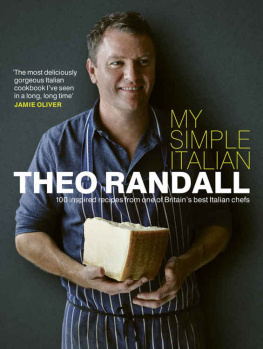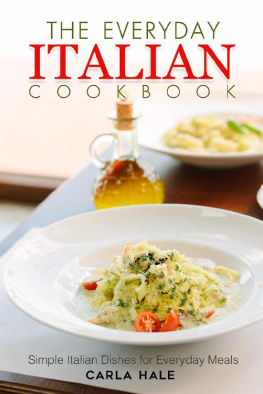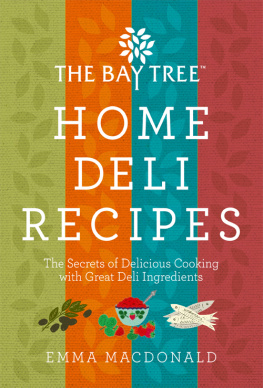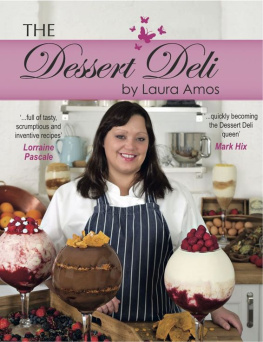Randall Theo - The Italian Deli Cookbook
Here you can read online Randall Theo - The Italian Deli Cookbook full text of the book (entire story) in english for free. Download pdf and epub, get meaning, cover and reviews about this ebook. year: 2021, publisher: Quadrille Publishing, Limited, genre: Home and family. Description of the work, (preface) as well as reviews are available. Best literature library LitArk.com created for fans of good reading and offers a wide selection of genres:
Romance novel
Science fiction
Adventure
Detective
Science
History
Home and family
Prose
Art
Politics
Computer
Non-fiction
Religion
Business
Children
Humor
Choose a favorite category and find really read worthwhile books. Enjoy immersion in the world of imagination, feel the emotions of the characters or learn something new for yourself, make an fascinating discovery.
- Book:The Italian Deli Cookbook
- Author:
- Publisher:Quadrille Publishing, Limited
- Genre:
- Year:2021
- Rating:5 / 5
- Favourites:Add to favourites
- Your mark:
- 100
- 1
- 2
- 3
- 4
- 5
The Italian Deli Cookbook: summary, description and annotation
We offer to read an annotation, description, summary or preface (depends on what the author of the book "The Italian Deli Cookbook" wrote himself). If you haven't found the necessary information about the book — write in the comments, we will try to find it.
The Italian Deli Cookbook — read online for free the complete book (whole text) full work
Below is the text of the book, divided by pages. System saving the place of the last page read, allows you to conveniently read the book "The Italian Deli Cookbook" online for free, without having to search again every time where you left off. Put a bookmark, and you can go to the page where you finished reading at any time.
Font size:
Interval:
Bookmark:



The Italian Deli Cookbook is a book I have been wanting to write for years. I find myself looking in my cupboards for inspiration regularly, and there is always something that pops out; it could be a tin of anchovies or a jar of olives that gets me thinking This kind of instinctive cooking is something I have always known. Growing up, our kitchen cupboards were full of goodies that had been picked up on summer holidays: wed drive to France and Italy and, on the return trip, the back of the car and trailer would be laden with olive oil, wine and ingredients that were impossible to find in 1970s London. My mother, Rosemary, was an artist by trade but a natural cook. She taught me that cooking is instinctive and must be seasonal. I can picture her coming home, not from the supermarket but from the open market in Kingston upon Thames, arms laden with bags full of fruit, vegetables, fish, offal, you name it. Our cellar was brimming with wines and jars of homemade preserves and jams. On country walks, she would pick sloes to make gin; in autumn she would pickle the walnuts from the big tree in the garden. I was always the odd kid at school bringing homemade bread and gorgonzola sandwiches for my packed lunch.
We had apple, pear and plum trees in the garden, and grew vegetables of all kinds, so there were always lots of jars filled with gluts of garden offerings, lurking in the shadows of the deep cupboards, some very much out of date. We also had a very large elderflower tree at the bottom of the garden and when it flowered my mother would make (what we playfully called) elderflower champagne. This was always served on special occasions for me and my sisters, Claudia and Justine. The truth was, unbeknown to my parents, the elderflower champagne had something in common with its superior cousin from France: it was actually alcoholic. The recipe included a substantial amount of sugar so, when it was bottled and stored in the cellar, the sugar would turn into alcohol. My parents never understood why we fell asleep so quickly after dinner
I wrote this book during the first 2020 lockdown in the UK when we were all at home wondering what to cook with limited availability of supplies. This made testing recipes difficult, but it did make me realize how important it is to be well stocked with those little extras that make all the difference to a dish. For instance, I always find myself going to particular delis that sell certain brands of dried pasta, olive oil, passata or olives, because I never want to be without those particularly trusted items, those store-cupboard ingredients that will transform a plate of food. They dont have to be very expensive, just the ones you trust. Whenever I walk past an interesting food shop, I will go in and buy something totally random and use that item as inspiration to cook something. This is, I think, a really rewarding way to cook.
This book is intended as a tribute to the Italian deli. First arriving on foreign shores along with Italian migr communities, these delicatessens were a lifeline for Italians missing the food of their homeland. Bizarrely, as recently as the 1970s, olive oil in Britain was only available in chemists, where it was sold to treat ear complaints. My first recollection of an Italian deli was when my mother brought home a piece of fresh Parmesan and grated it over a bowl of pasta for me. The flavour was so different to anything Id had before. It made me realize that authentic, fresh ingredients were crucial in the final flavour of a dish. And this ethos is what Italian cooking is built on: simple food made using exceptional ingredients.
For me, the charm and success of the Italian deli comes down to their authenticity, dependability and transformative ingredients forever staying true to the cooking and eating philosophies of Italy. We should never underestimate their value and should continue to support them whenever possible. So, explore the magic of your local Italian deli, pick up a treat or two and bring a little bit of Italy into your home.



Ciabatta French toasts
Serves 4
4 organic eggs
100ml (3fl oz) whole milk
1 tsp vanilla extract
1 tsp ground cinnamon
2 medium ciabatta loaves, or 1 large
50g (1oz) unsalted butter
60g (2oz) caster (superfine) sugar
My mum used make this dish for us when we were children always when we were on holiday when I guess the freshness of a ciabatta or baguette lasted only a day, so her frugal Scottish nature meant she had to reinvent any leftovers. Its now one of Max and Lolas favourites, making its way through the generations.

In a bowl, beat together the eggs, milk, vanilla extract and cinnamon until well combined.
Cut the ciabatta into 4cm (1in) slices.
Dip the pieces of ciabatta into the egg mixture and leave to soak for 12 minutes.
Heat a large, non-stick frying pan over a medium heat. Melt the butter, then when it starts to foam, take the ciabatta slices out of the egg mixture and place them straight into the pan. Cook for 3 minutes, then turn over and cook for a further 3 minutes, until golden. (Do this in batches, if necessary.)
Sprinkle over the sugar while the toasts are still in the hot pan, until it starts to melt, then serve with a cafetire of strong coffee.

Nduja baked eggs with red peppers and onions
Serves 24
3 red (bell) peppers, halved and deseeded
3 tbsp olive oil, plus extra for drizzling
2 garlic cloves, finely sliced
2 red onions, sliced
2 tbsp chopped flat-leaf parsley
100g (3oz) nduja
4 organic eggs
sea salt and freshly ground black pepper
1 large ciabatta loaf, sliced and toasted, to serve
Slow-cooked peppers are really tasty add nduja and they become amazing. Peppers vary a lot the large, knobbly Italian and Spanish ones available in the spring and summer are by far the best. (The perfectly formed rounded ones are okay, but can be a bit watery.) Cook them slowly so that they caramelize, softening the skins and increasing the intensity of their flavour. This is a very simple lunch or brunch or supper dish. Just a little cooking and some good bread are all you need.

Place the peppers cut sides downwards on a chopping board. Using a sharp knife, slice them across into 5mm (in) slices.
Heat the olive oil in a frying pan on a medium heat. Add the sliced peppers, garlic and red onions and season with salt. Put a lid on the pan and cook for 15 minutes, stirring occasionally. Remove the lid and continue to cook for a further 5 minutes, until the peppers are sticky and softened. Add the chopped parsley and nduja and cook for 5 minutes.
Font size:
Interval:
Bookmark:
Similar books «The Italian Deli Cookbook»
Look at similar books to The Italian Deli Cookbook. We have selected literature similar in name and meaning in the hope of providing readers with more options to find new, interesting, not yet read works.
Discussion, reviews of the book The Italian Deli Cookbook and just readers' own opinions. Leave your comments, write what you think about the work, its meaning or the main characters. Specify what exactly you liked and what you didn't like, and why you think so.


